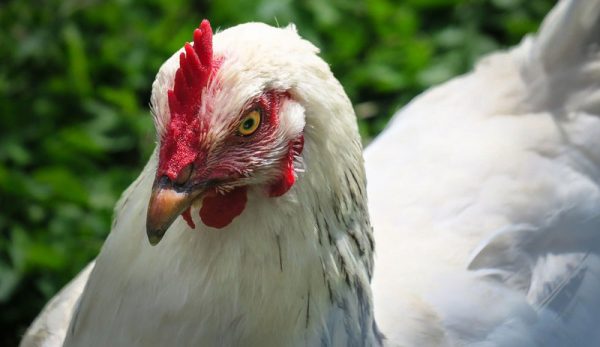
I absolutely love helping out new backyard flock owners. Their excitement and enthusiasm, coupled with sincere concern for the birds they raise, make me eager to take them under my wing, so to speak. I’m always happy to share my knowledge and experience with them and to answer their questions, regardless of how many times I’ve heard them in the past.
At our poultry-owners’ group meeting this past week, however, a question I’ve never heard completely stunned me into silence … and that’s saying a lot!
The fledgling flock owner—a young woman named Kat—seemed hesitant to ask me something but simply had to get her question off her chest. Earlier, she’d lovingly spoken of her baby chicks, a sextet of Wyandottes, Orpingtons and Plymouth Rocks she’d been unable to resist at our local farm-supply store.
She’d already asked about Salmonella and handling chicks as well as about the difference between starter and grower. She’d held back, however, when other new group members asked about preparing nestboxes, estimated point of lay, and other matters related to older birds.
Finally, Kat blurted out, “I’m sorry, but is there really any point to this? I mean, I love my chicks so much, but my mom told me that chickens are cannibals so I shouldn’t count on my chicks lasting to adulthood. Is that true?”
It was so quiet you could hear a pinfeather drop. The expressions on people’s faces told me they were either thunderstruck, like me, or they were concerned about the same question. Are chickens cannibals?
The answer is no … and yes.
Read more: chickens Pecking order changes can present real challenges for chicken-keepers.
No, Chickens Are Not Cannibals
When we hear the word cannibal, images of Hannibal Lecter or storybook South Pacific tribes tend to pop into our minds. Our understanding of the term is definitely colored by fiction. It’s therefore completely comprehensible that Kat’s mother, having read somewhere that chickens can succumb to cannibalism, tried to dissuade her daughter from keeping backyard poultry.
After all, who wants to open up their coop just to find bloody-beaked birds fiendishly feasting on a former flockmate?
Fear not, folks: Chickens are not cannibals. Your Houdans will not be hunting each other in the coop or run, nor will your Leghorns lay in wait for layers. Yes, there will be pecking-order squabbles and, occasionally, some downright bullying.
But you can rest assured that your baby chicks will not grow up simply to rip each other into shredded chicken.
Yes, Chickens Are Cannibals
That being said, chickens are indeed omnivores who, given the opportunity, will eat just about anything. This does not mean they will turn on each other when our backs are turned. But under negative conditions, they may start picking at the combs, feathers, toes and vents of lower-ranked birds in the flock.
An open wound or a bleeding injury that results from this picking can serve as an open invitation to the rest of the flock to start physically assaulting the victim … and may result in the harassed bird’s death.
It’s not cannibalism, per se, but chickens can injure or even kill each other this way.
For this reason, always separate an injured chicken from her flock. Allow the bird to fully recuperate in a separate coop, brooder, pen or even a large cardboard box before returning h2 er to her coop. Similarly, immediately remove deceased birds before curiosity gets the best of the rest of the flock.
Read more: Bust coop boredom with these environmental enrichments!
Causes of Cannibalism
As long as you maintain a healthful living environment for your chickens, with plenty of nutritious feed, clean water, nestboxes, and space to explore and spread their wings, you should not have any worries about cannibalism amongst your flock.
But stay wary of the following conditions, which will cause stress and can start your chickens down the road to cannibalism.
- Overcrowding: Allow for at least 2 square feet per bird inside your coop, and provide a spacious run or yard for them to explore
- Excessive heat: When chickens become uncomfortably hot, they begin picking at each other. Only maintain a heated environment for the first few weeks of a chicken’s life
- Excessive light: Constant light and extremely bright light can cause chickens to become hostile towards each other. Never light your coop or brooder more than 16 hours per day, and only use bulbs that are 15 to 25 watts.
- Absence/shortage of food/water: Always provide access to food and water around the clock, since the pecking order determines which birds get to eat and drink at which times. If there isn’t enough food or water, hungry and thirsty birds will behave aggressively toward each other
- Shortage of nesting boxes: When layers have to fight for nesting-box space, vicious vent pecking may take place. Always provide at least one box for every four hens.
Cures for Cannibalism
If you have observed cannibalistic behavior in your flock, take action as swiftly as possible. Isolate injured birds, and remove heat lamps or heating panels to cool down the temperature inside the coop.
If you use artificial lighting, switch to low-watt red bulbs or remove the lighting altogether. If your coop is overcrowded—and with chicken math, this is frequently the case when it comes to backyard-flock cannibalism—you may have to rehome some of your birds or build a second henhouse.
Provide your chickens with boredom busters such as suet cakes, heads of cabbage, scratch balls and shiny strung-up CDs to keep their attention off each other. Do everything you can to ensure that their living environment is a positive, healthy one.




